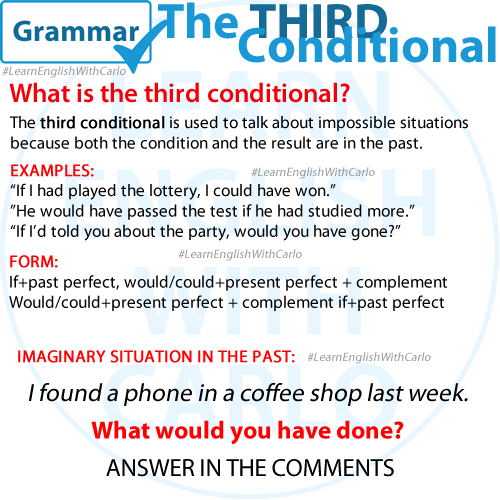What is the third conditional?
The Third Conditional is used to talk about hypothetical or unreal situations in the past and their imagined outcomes. It’s commonly used to express regrets, wishes, or events that didn’t happen.
Examples:
- If I had played the lottery, I could have won.
- He would have passed the test if he had studied more.
- If I’d told you about the party, would you have gone?
In each case, the situation is impossible to change because it’s already in the past.
Forming the Third Conditional
The Third Conditional has a specific structure:
- If-clause (Past Perfect): This describes the unreal condition in the past that didn’t happen.
- Form: If + past perfect tense (had + past participle)
- Main clause (Would Have + Past Participle): This describes the hypothetical result.
- Form: Would have + past participle
Examples:
Explanation: If I had studied harder is the condition in the past, and I would have passed the exam is the hypothetical result.
If I had studied harder, I would have passed the exam.
MORE EXAMPLES
- If she had known about the traffic, she wouldn’t have been late.
- If they had invited us, we would have gone to the party.
- If I had saved more money, I would have bought a new car last year.
Uses of the Third Conditional in Everyday English
The Third Conditional is especially useful for:
- Expressing regret: If I had left earlier, I wouldn’t have missed the train.
- Discussing missed opportunities: If you had come to the concert, you would have loved it.
- Pondering “what if” scenarios: If we had taken the other route, we could have avoided the traffic.
Common Alternatives for Expressing Hypotheticals
In the main clause, would have can be replaced with could have (to indicate ability) or might have (to show possibility).
- If I had known, I could have helped.
- If he had left earlier, he might have arrived on time.
Practice Sentences
Try to create sentences with the Third Conditional to describe hypothetical past events. Here are some prompts:
- If I had gone to bed earlier, ___________.
- If she hadn’t forgotten her keys, ___________.
- If they had planned their trip better, ___________.
Summary
The Third Conditional helps us talk about past possibilities that didn’t happen, allowing us to reflect on hypothetical outcomes. Remember, it always uses the Past Perfect for the condition and would have (or could have/might have) for the result.

FAQs About the Third Conditional
1. Can I use “could have” or “might have” instead of “would have” in the main clause?
Yes, absolutely! While “would have” is the most common form, using “could have” or “might have” changes the meaning slightly:
- Would have implies a certain result (e.g., If I had studied, I would have passed).
- Could have suggests ability (e.g., If I had saved more, I could have bought a new car).
- Might have shows possibility or uncertainty (e.g., If he had asked, I might have agreed).
2. Can I reverse the clauses in a Third Conditional sentence?
Yes, you can. The order of clauses doesn’t change the meaning. Just remember to omit the comma when the main clause comes first.
- If I had left earlier, I would have caught the train.
- I would have caught the train if I had left earlier.
3. How is the Third Conditional different from the Second Conditional?
The Second Conditional talks about hypothetical situations in the present or future, while the Third Conditional focuses on unreal situations in the past.
- Second Conditional: If I won the lottery, I would buy a house (present/future possibility).
- Third Conditional: If I had won the lottery, I would have bought a house (past possibility that didn’t happen).
4. Can I use contractions in the Third Conditional?
Yes! Contractions are common in everyday English and make sentences sound more natural.
- If I’d known earlier, I wouldn’t have missed it.
- If he’d told you, you could’ve made different plans.
5. Why do we use the Past Perfect in the if-clause?
The Past Perfect in the if-clause indicates that the action or condition is unreal and belongs entirely to the past. This helps show that the event didn’t happen and can no longer happen.
6. Is it okay to use the Third Conditional to talk about emotions?
Definitely. The Third Conditional is often used to express regret or disappointment about the past.
- If I had called her, she wouldn’t have been upset.
- If they had told me earlier, I wouldn’t have felt so anxious.
